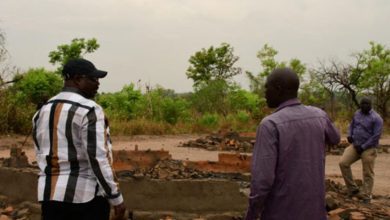
Global Politics
ICC Trust Fund for Victims welcomes the end of the judicial reparations phase in the Ongwen case
ICC trust funds used to humiliates Africans, instead to bring to booked the government misdeed in Northern Uganda, analyst editor view
Photo: In 2024, the Trust Fund for Victims at the International Criminal Court conducted victim-centred consultations with almost 3,000 victims in northern Uganda. The same year, the TFV launched
its first €5 million funding appeal in the Ongwen case to begin implementing the €52.4 million reparations order issued by the Trial Chamber, expected to benefit approximately 50,000 victims.
The Trust Fund for Victims (TFV) at the International Criminal Court (ICC) welcomes the conclusion of the judicial reparations phase following the confirmation of the Reparations Order by the ICC Appeals Chamber on 7 April 2025 in the case of The Prosecutor v. Dominic Ongwen.
With the Appeals Chamber judgment, that addressed all grounds of appeals that had been submitted by Mr Ongwen’s Defence, the Reparations Order is now final. The Appeals judgment confirms the award of EUR 52.4 million to nearly 50,000 victims of crimes against humanity and war crimes for which Mr Dominic Ongwen was convicted. The reparations will be delivered through symbolic cash payments, medical, psychological and socio-economic rehabilitation programmes, as well as community commemoration and other symbolic activities in line with the Implementation Plan proposed by the TFV and approved by Trial Chamber II on 18 February 2025. The Implementation Plan reflects the views of victims and has at its center a participatory mechanism to ensure the close involvement of the community of victims throughout the implementation of reparations.
Reacting to the judgment of the Appeals Chamber, Andres Parmas, the Chair of the TFV Board of Directors stated, “The judgment of the Appeals Chamber provides certainty to the amount of liability of the convicted person and the scope of the Reparations Order. As the process of locating victims and assessing their eligibility is ongoing under the responsibility of the Registry and considering the indigency of the convicted person, the Board of Directors calls on the Government of Uganda, other State Parties, organisations and individuals to generously respond to the TFV´s Funding Appeal to initiate the programme as soon as possible.”
In June 2024, the TFV issued a first Funding Appeal for voluntary contributions of EUR 5 million to initiate the reparations programme addressing the most urgent needs of victims of sexual- and gender-based violence, including sexual slavery and forced marriage, children born out of rape, former child soldier and victims of attacks on four IDP camps. The reparations programme also strives for long term impact by addressing the youth, as well as through interventions that reinforce trust in institutions and the rule of law.
For more information about the Trust Fund for Victims, please contact trustfundforvictims@icc-cpi.int or visit www.trustfundforvictims.org. You can also follow TFV’s activities on X, LinkedIn, Bluesky and Facebook.
Background information about the Trust Fund for Victims
The Trust Fund for Victims (TFV) was established by the Assembly of States Parties to the International Criminal Court (ASP) in 2002, pursuant to Article 79 of the Rome Statute. It is governed by a Board of Directors elected by, and accountable to, the ASP. The TFV seeks to redress the harm suffered by victims of crimes under the jurisdiction of the ICC through the implementation of reparations and other programmes for the benefit of victims, including assistance programmes. As of today, the TFV maintains programmes in seven situations under the jurisdiction of the Court: the Central African Republic, Côte d’Ivoire, the Democratic Republic of the Congo, Kenya, Georgia, Mali, and Uganda.
The goals of the TFV include giving visibility to the plight of victims and mobilising resources for their benefit—specifically victims of genocide, crimes against humanity, war crimes, and the crime of aggression, as well as their families. In line with the principle of complementarity under the Rome Statute, and in accordance with States’ obligations under international human rights law, the TFV also contributes to advancing domestic and international reparations efforts. This includes knowledge sharing and support to initiatives that strengthen national authorities’ responses to the rights and needs of victims of crimes of concern to the international community.
Recognising that conflict-related violence severely affects access to healthcare, education, economic opportunity, and exacerbates poverty and gender-based inequalities, the TFV’s work contributes not only to Sustainable Development Goal (SDG) 16 on peace, justice, and strong institutions, but also to SDGs 1, 2, 3, 4, 5, 8, 10, 13 and 17—covering no poverty, zero hunger, good health and well-being, quality education, gender equality, decent work and economic growth, reduced inequalities, climate action, and partnerships for the goals.




